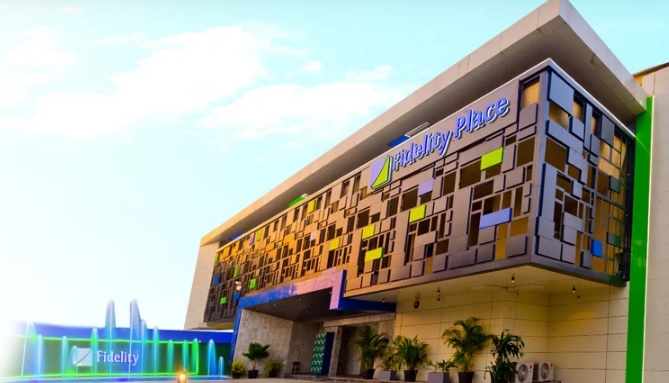Business
Fidelity Bank outperforms banks, stock market with 507% gain in 5 years

Investors in Fidelity Bank Plc have earned more than 507 per cent in capital gains over the past five years, ranking above all other major return benchmarks at the Nigerian stock market and the entire banking sector.
Trading reports at the Nigerian stock market for the five-year period between May 31, 2019 and May 31, 2024 showed that Fidelity Bank outperformed all key indices at the stock market.
Fidelity Banks share price rose by 507.14 per cent over the period, representing average annual capital gain of 101.43 per cent.
These returns underscore Fidelity Banks immense value as a stock for all times, helping investors to hedge against inflation while preserving significant long-term value.
With 507 per cent capital gain in five years and average annual gain of more than 100 per cent, the return analysis implies that investment in Fidelity Bank is more attractive than other class of assets, including fixed-income securities such as government and corporate bonds; real estate investment and mutual funds among others.
The high divisible nature of shares investment and high free float of Fidelity Bank, which makes the banks shares easily available, underline the bank as a most attractive investment option for all cadres of investors- small, medium and high networth; retail and institutional investors.
Comparative analysis showed that Fidelity Bank outperformed all other major market indices with the banks average annual return for the period twice the average return by the overall market and almost four times of average return in the banking sector.
The All Share Index (ASI) – the common, value-based index that tracks all share prices at the Nigerian Exchange (NGX), which is widely regarded as Nigerias benchmark for equities market, recorded a five-year return of 219.61 per cent, an average annual return of 43.9 per cent.
Contrary to the significantly above average performance of Fidelity Bank, the NGX Banking Index-which tracks the banking sector, doubled by 120.53 per cent over the five-year period, representing average annual return of 24.11 per cent, more than 77 percentage points below Fidelity Banks average return.
Two other major price indices- the NGX 30 Index and NGX Main Board Index, recorded five-year cumulative return of 185.73 per cent and 265.6 per cent respectively, representing average annual gain of 37.15 per cent and 53.1 per cent respectively.
The NGX 30 Index tracks share prices of the 30 largest companies at the stock market while the NGX Main Board Index represents the largest and most diversified group of listed companies at the stock exchange. Fidelity Bank is quoted on the main board, like most other major banks and companies at the stock market.
The average annual return of 101.43 per cent underlines that Fidelity Bank provides substantial return for investors, even where such investors had borrowed money at the ruling interest rate and the invested fund was adjusted for impact of inflation rate.
Nigerias inflation rate peaked at a high of 33.69 per cent in April 2024 while the Central Bank of Nigeria (CBN)s Monetary Policy Committee (MPC) recently increased the Monetary Policy Rate (MPR), otherwise known as benchmark interest rate, to 26.25 per cent.
Fidelity Banks share price, which closed May 31, 2019 at N1.68 per share, rose successively to N10.20 per share by the end of May 2024. The ASI had, during the period, rose from its opening index of 31,069.37 points to close weekend at 99,300.38 points. The NGX Banking Index rose from 361.57 points to 797.37 points. The NGX 30 Index, which opened the period at 1,286.68 points, closed the period at 3,676.44 points. The NGX Main Board Index appreciated from 1,267.54 points to close weekend at 4,634.31 points.
Market analysts are unanimous that share prices are illustrative of the fundamental values of quoted companies.
Managing Director, HighCap Securities Limited, Mr. David Adonri, said the price of any stock in the market is a correct reflection of the market value for the stock.
Managing Director, Globalview Capital Limited, Mr. Aruna Kebira, explained that the market price of a stock represents the disposition of the investing public to the stock at a given period, noting that there should be consideration for both the market value and the book value or fundamentals of a stock.
It could be summarized that the market price of a stock is premised on the psychology of the market, the markets mood as well as market sentiments, Kebira said.
Chief Executive Officer, Sofunix Investment and Communications, Mr. Sola Oni, said the stock market shows both the current and future prospects of shares.
Share price reflects the current value of a company but also reveals the future prospects, Oni said, noting that investment analysts traditionally combine market price and book values to determine the possible outlook of a stock.
Five-year review of the audited reports and accounts of Fidelity Bank showed strong correlation between the banks upwardly share pricing trend and expansive growth in its business operations.
The banks pre-tax profit had risen from N30.35 billion in 2019 to N124.26 billion in 2023, an increase of 309.4 per cent. Net profit after tax also grew by 203.3 per cent from N42.80 billion in 2019 to N129.80 billion in 2023. Earnings per share has risen successively from 98 kobo in 2019 to N3.11 per share in 2023.
The banks balance sheet had expanded by 195.26 per cent from N2.11 trillion in 2019 to N6.23 trillion in 2023, within the fastest growth in the industry. Customers deposits, which underlines the competitive market share, more than tripled from N1.225 trillion in 2019 to N4.01 trillion in 2023, an increase of 227.35 per cent. Shareholders funds had also grown from N234.03 billion to N437.31 billion.
Market pundits expected Fidelity Banks share price continue to rise, citing several factors that illustrated the upside potential for the stock.
Independent investment research reports by many market pundits showed that Fidelity Bank was assigned buy ticker, a recommendation to investors to consider the potential attractive returns of the bank.
The research reports were based on the historical and current operational performances of the bank as well as the clear-sighted implementation of the banks growth plan. The reports also considered the quality of board and management and the general human capital and resources of the bank.
The investment advisory reports included those of Afrinvest Group, FSDH Capital and CardinalStone among others.
Analysts were unanimous that Fidelity Banks share price could double in the period ahead given professional assessment of top traditional performance parameters including the companys operational reports, investors preference and projections.
Already, interim report and account of the bank for the first quarter ended March 31, 2024 showed that the bank started the current business year on stronger footing with three-digit growths across key performance indicators.
The three-month report, released at the NGX, showed that gross earnings increased by 89.9 per cent to N192.1 billion in first quarter 2024.
The banks top-line performance continued to be driven by broad-based growths across income lines with interest income rising by 90.7 per cent and non-interest income growing by 84 per cent in first quarter 2024.
Growth in interest income was primarily spurred by a higher yield environment and strong earning assets base, while the increase in non-interest income was led by double-digit growth in account maintenance charges, foreign exchange (forex)-related income, trade, banking services, and remittances, supported by increased customer transactions.
Profit before tax doubled by 120 per cent to N39.5 billion in first quarter 2024 as against N17.9 billion in first quarter 2023. The banks performance was driven by expanding market share with total deposit rising by 17 per cent within the three months to N4.7 trillion, compared with N4 trillion recorded at the end of 2023. The bank also increased its supports for national economic growth with net loans and advances rising by 21 per cent from N3.1 trillion at the end of 2023 to N3.7 trillion by March 2024.
Business
Nigeria’s Inflation Drops to 15.10% as NBS Reports Deflationary Trend

Nigeria’s headline inflation rate declined to 15.10 per cent in January 2026, marking a significant drop from 27.61 per cent recorded in January 2025, according to the latest Consumer Price Index (CPI) report released by the National Bureau of Statistics.
The report also showed that month-on-month inflation recorded a deflationary trend of –2.88 per cent, representing a 3.42 percentage-point decrease compared to December 2025. Analysts say the development signals easing price pressures across key sectors of the economy.
Food inflation stood at 8.89 per cent year-on-year, down from 29.63 per cent in January 2025. On a month-on-month basis, food prices declined by 6.02 per cent, reflecting lower costs in several staple commodities.
The data suggests a sustained downward trajectory in inflation over the past 12 months, pointing to improving macroeconomic stability.
The administration of President Bola Ahmed Tinubu has consistently attributed recent economic adjustments to ongoing fiscal and monetary reforms aimed at stabilising prices, boosting agricultural output, and strengthening domestic supply chains.
Economic analysts note that while the latest figures indicate progress, sustaining the downward trend will depend on continued policy discipline, exchange rate stability, and improvements in food production and distribution.
The January report provides one of the clearest indications yet that inflationary pressures, which surged in early 2025, may be moderating.
Bank
Alpha Morgan to Host 19th Economic Review Webinar

Alpha Morgan to Host 19th Economic Review Webinar
In an economy shaped by constant shifts, the edge often belongs to those with the right information.
On Wednesday, February 25, 2026, Alpha Morgan Bank will host the 19th edition of its Economic Review Webinar, a high-level thought leadership session designed to equip businesses, investors, and individuals with timely financial and economic insight.
The session, which will hold live on Zoom at 10:00am WAT and will feature economist Bismarck Rewane, who will examine the key signals influencing Nigeria’s economic direction in 2026, including policy trends, market movements, and global developments shaping the local landscape.
With a consistent track record of delivering clarity in uncertain times, the Alpha Morgan Economic Review continues to provide practical context for decision-making in a dynamic environment.
Registration for the 19th Alpha Morgan Economic Review is free and can be completed via https://bit.ly/registeramerseries19
It is a bi-monthly platform that is open to the public and is held virtually.
Visit www.alphamorganbank to know more.
Business
GTBank Launches Quick Airtime Loan at 2.95%

GTBank Launches Quick Airtime Loan at 2.95%
Guaranty Trust Bank Ltd (GTBank), the flagship banking franchise of GTCO Plc, Africa’s leading financial services group, today announced the launch of Quick Airtime Loan, an innovative digital solution that gives customers instant access to airtime when they run out of call credit and have limited funds in their bank accounts, ensuring customers can stay connected when it matters most.
In today’s always-on world, running out of airtime is more than a minor inconvenience. It can mean missed opportunities, disrupted plans, and lost connections, often at the very moment when funds are tight, and options are limited. Quick Airtime Loan was created to solve this problem, offering customers instant access to airtime on credit, directly from their bank. With Quick Airtime Loan, eligible GTBank customers can access from ₦100 and up to ₦10,000 by dialing *737*90#. Available across all major mobile networks in Nigeria, the service will soon expand to include data loans, further strengthening its proposition as a reliable on-demand platform.
For years, the airtime credit market has been dominated by Telcos, where charges for this service are at 15%. GTBank is now changing the narrative by offering a customer-centric, bank-led digital alternative priced at 2.95%. Built on transparency, convenience and affordability, Quick Airtime Loan has the potential to broaden access to airtime, deliver meaningful cost savings for millions of Nigerians, and redefine how financial services show up in everyday life, not just in banking moments.
Commenting on the product launch, Miriam Olusanya, Managing Director of Guaranty Trust Bank Ltd, said: “Quick Airtime Loan reflects GTBank’s continued focus on delivering digital solutions that are relevant, accessible, and built around real customer needs. The solution underscores the power of a connected financial ecosystem, combining GTBank’s digital reach and lending expertise with the capabilities of HabariPay to deliver a smooth, end-to-end experience. By leveraging unique strengths across the Group, we are able to accelerate innovation, strengthen execution, and deliver a more integrated customer experience across all our service channels.”
Importantly, Quick Airtime Loan highlights GTCO’s evolution as a fully diversified financial services group. Leveraging HabariPay’s Squad, the solution reinforces the Group’s ecosystem proposition by bringing together banking, payment technology, and digital channels to deliver intuitive, one-stop experiences for customers.
With this new product launch, Guaranty Trust Bank is extending its legacy of pioneering digital-first solutions that have redefined customer access to financial services across the industry, building on the proven strength of its widely adopted QuickCredit offering and the convenience of the Bank’s iconic *737# USSD Banking platform.
About Guaranty Trust Bank
Guaranty Trust Bank (GTBank) is the flagship banking franchise of GTCO Plc, a leading financial services group with a strong presence across Africa and the United Kingdom. The Bank is widely recognized for its leadership in digital banking, customer experience, and innovative financial solutions that deliver value to individuals, businesses, and communities.
About HabariPay
HabariPay is the payments fintech subsidiary of GTCO Plc, focused on enabling fast, secure, and accessible digital payments for individuals and businesses. By integrating payments and digital technology, HabariPay supports innovative services that make everyday financial interactions simpler and more seamless.
Enquiries:
GTCO
Group Corporate Communication
[email protected]
+234-1-2715227
www.gtcoplc.com
-

 celebrity radar - gossips6 months ago
celebrity radar - gossips6 months agoWhy Babangida’s Hilltop Home Became Nigeria’s Political “Mecca”
-

 society6 months ago
society6 months agoPower is a Loan, Not a Possession: The Sacred Duty of Planting People
-

 society5 months ago
society5 months agoReligion: Africa’s Oldest Weapon of Enslavement and the Forgotten Truth
-

 news6 months ago
news6 months agoTHE APPOINTMENT OF WASIU AYINDE BY THE FEDERAL GOVERNMENT AS AN AMBASSADOR SOUNDS EMBARRASSING









